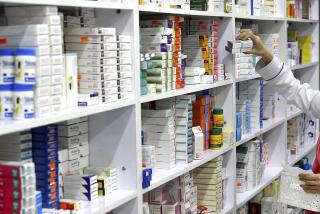FDA’s Last-Minute Approvals Give British Pharmaceutical Stocks a Shot in the Arm : Drugs: Products by Glaxo, SmithKline Beecham, Boots, Fisons and Amersham International get a green light.
- Share via
LONDON — British pharmaceutical shares got a big new-year lift from decisions last week by the U.S. Food and Drug Administration to approve various drugs for sale in the world’s biggest health care market.
“At the end of the year, you always get a rush of approvals through” from the FDA, said Andrew Porter, drug analyst at Nikko Europe, the London branch of the Japanese broker. After working on drug applications all year, the FDA makes a “special effort at the end of the year to get approvals through” so companies can rush products to market in the new year, he said.
“A number of drugs are approved by the FDA at the December clear-out,” sometimes as many as 40% of all annual approvals in the last three days of the year, said Martin Hall, analyst at James Capel & Co.
As far as Glaxo Holdings, SmithKline Beecham, Boots Co., Fisons and Amersham International are concerned, the sooner the better.
Glaxo, the biggest stock in London based on market capitalization, jumped 6% last week to $11.98 per share after the FDA gave it permission last week to sell an injectable form of its Imitrex anti-migraine drug. An oral version is still awaiting FDA approval. Known as Imigran outside the United States, the drug is already sold in 22 countries around the world.
SmithKline Beecham saw its London common shares rise 2.5% on New Year’s Eve after the FDA signed off on its Paxil drug to treat depression. In October, Merrill Lynch analyst Eile Gibson said Paxil could generate $850 million in annual sales by 1996.
SmithKline needed the lift. Even at the year-end closing price, its shares were down 12.5% from a 52-week high of $8.57 reached late in September.
Boots Co. shares hit a 52-week high on New Year’s Eve of $8.63 after the FDA approved its long-awaited Manoplax drug for congestive heart failure. “Manoplax presents a major opportunity for Boots Pharmaceuticals in the U.S. market,” where 3 million people suffer heart failure, Chief Executive James Blyth said.
Boots, up 29% in 1992, outperformed the rest of the FT-SE 100 index of blue chip British stocks by 6.5%. The FT-SE rose 14.2% during the year.
Beleaguered drug and scientific equipment maker Fisons rose 6.5% to $3.70 last week after the FDA approved its Tilade anti-asthma drug.
Analysts hailed the move, which came weeks after the company withdrew from the consumer health market by selling its U.S. over-the-counter arm for $140 million and the British wing for $136 million.
Annual U.S. sales of Tilade could reach $150 million within three to five years, said drug analyst Peter Laing of Societe Generale Strauss Turnbull Securities.
Amersham International, the smallest stock in the quintet, climbed 2.8% on New Year’s Eve to $9.35 per share after its Indiclor radio imaging agent was approved for use with Cytogen Corp.’s OncoScint diagnostic kit for bowel and ovarian cancer.
Amersham, sold by the British government in 1981 as the first in a giant program to sell state-owned assets, closed at a 1992 high on Thursday.
Wellcome,, maker of the anti-AIDS drug Retrovir and, with Glaxo and SmithKline, one of Britain’s three largest pharmaceutical stocks, also heard good news from U.S. officials last week.
A clinical study by the National Institutes of Allergy and Infectious Diseases shows Retrovir is more effective than Bristol-Myers Squibb Co.’s competing drug, didanosine, in treating people with advanced HIV infection who had no previous treatment.
More to Read
Inside the business of entertainment
The Wide Shot brings you news, analysis and insights on everything from streaming wars to production — and what it all means for the future.
You may occasionally receive promotional content from the Los Angeles Times.










